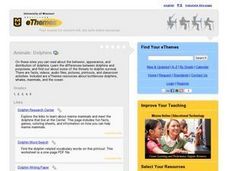Curated OER
Walrus
In this animal facts worksheet, students will read information about walruses including where they live and what they eat. Then students will color a picture of a walrus.
Curated OER
How Can We Help?
Students explore ocean animals and their environments. In this environmental stewardship lesson, students read a story and discuss the environmental needs of animals. Students think of ways to help clean up the environment and to make...
Curated OER
Animals: Dolphins
Learners use the internet to discover information about dolphins. They examine their behavior, appearance and distribution of dolphins.
Utah LessonPlans
Water, Please!
Students use a globe and cups of water to illustrated the amount of water versus land on earth and the amount of fresh versus salt water available to plants and animals.
Curated OER
Three Clouds Activity
Students explore how clouds are produced through three different age-appropriate hands-on experiments.
Curated OER
Wanted: Water!
Learners determine what percentage of the Earth is water and how much water is needed by humans.
Curated OER
Native Americans and Topography at Rose Bay
Students visit a wetland ecosystem. While they are there, students explore how to read topography maps of Rose Bay.
Curated OER
Watercolor Ways
Students investigate the concept of being part of a global community. In this global community lesson, students learning the definition of stewardship as it relates to taking care of the Earth. They listen to the lyrics of the song,...
Curated OER
Water Cycle and Ecosystems
Learners explore the water cycle. In this investigative lesson, students examine the water cycle process. They will record their observations and discuss marine and freshwater ecosystems.
Curated OER
How Does Whale Blubber Work?
Students perform an experiment to find out how whale blubber keeps whales warm in cold temperatures. They use Ziploc bags lathered in shortening to simulate whale blubber. They put their hands in cold water, both with and without the bags.
Curated OER
Shake, Rattle and Roll
Students compare the weathering of different-sized materials. Comparisons are made and data analyzed to reach conclusions about the process of weathering. Applications can be made for the higher grades.
Curated OER
JUST THROW IT AWAY!
Students different types of reusable trash containers to class. They use the pieces of trash to create something like a bird feeder. They discuss other ways of reusing items to generate less garbage.
Curated OER
Earth to Saturn, Earth to Saturn!
Students compare and contrast the characteristics of Earth and Saturn. They practice writing analogies using those characteristics. They complete a worksheet to end the lesson.
Curated OER
Web of Life
Students collect information about various organisms in a forest ecosystem and create a mural that depicts organism interdependence. They then simulate a food web using a ball of string.
Curated OER
Fish In a Bottle
Learners work together to build their own fish ecosystems. As a class, they share their prior knowledge about catfish and use a diagram to label its body parts. They record their observations of the ecosystem and determine what they...
Curated OER
Earth: The Apple of our Eye
Students are led through a demonstration in which they cut open an apple, which represents the earth. They follow through the hands-on lesson, cutting the apple into various portions--each representing some aspect of the earth.
Curated OER
Ice is N"ICE"!!
Students observe and describe, both orally and in writing. the different forms of water on the surface of the Earth and measure the approximate size of an iceberg. They also estimate and measure the amount of ice that floats above the...
Curated OER
The Science Behind Dolphins
Students discover facts about marine mammals, specifically dolphins. In this K-2 lesson plan, students identify the different species of Cetaceans, focusing on dolphins. Students answer true/false questions regarding cetaceans and...
Curated OER
Reading- Whales (Online Interactive)
In this whales activity, learners read a short text and learn about different kinds of whales. Students then read 8 sentences and answer "yes" or "no". This is an online interactive activity.
Curated OER
Taking Care of Nature (Religious)
Students discover how they can help care for the earth. For this environmental protection lesson, students discuss how God created the earth and what will happen if they fail to care for the earth properly. Students grow their own...
Curated OER
The Water Cycle Game
Students study the path and forms of water through Earth. In this water cycle lesson, students role-play water as it moves throughout the Earth. Students play the water cycle game and complete various stations to learn about water forms...
Curated OER
Water, Water Everywhere
Students study the location of Earth's water and study the water cycle using a terrarium. In this water study instructional activity, students study a model globe for the Earth and find Alaska. Students locate the bodies of water and...
Curated OER
Habitat, What is That?
Young scholars explore animal habitats. In this environmental stewardship lesson, students match animals to their habitats in a classroom activity. Young scholars also observe a firefly habitat and read Fireflies. Students create...
Other popular searches
- Continents and Oceans
- Continents Oceans
- Oceans and Seas
- Oceans of the World
- 7 Continents and Oceans
- Oceans and Climate
- Lesson Plans on Oceans
- Salty Oceans
- Salinity in the Oceans
- Lessons on Oceans
- Extent of Oceans
- Oceans and Climate Change

























